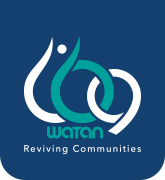Organization Brief
WATAN is a multi-cluster organization founded in 2012 as a coordinated effort of various organizations and groups working on the field since 2006. WATAN is an independent, non-governmental, apolitical, and non-sectarian organization. WATAN is registered as a non-profit organization in the United Kingdom, United States, Jordan, Iraq, and Turkey. The UK and US offices only perform advocacy and fundraising. The operational and management functions are located in Turkey. WATAN holds several offices inside Syria.
With nine years of experience in delivering assistance to people in need, WATAN currently operates under eight programs’ structure targeting Protection, Health, Education, NFI and Shelter, FSL, Economic Empowerment, Civil Society Support, and WASH. These programs are development-based and emergency-based. It has 9 years of experience implementing humanitarian projects. Throughout its activities, WATAN has provided assistance and aid to almost 7 million beneficiaries, in cooperation with UN agencies, International and National NGOs such as IRC, GOAL and Expertise France.
WATAN has the experience and expertise to implement this project successfully. It has a well-known rapid response network working on the ground to collect weekly updates and to coordinate with the local actors with whom it has established a deep and trusted relationship. WATAN is part of the local coordination meetings and is providing a significant effort to raise the capacity building of local actors for emergency purposes. Finally, WATAN is an active participant in humanitarian clusters: it participates in the meetings every month, offering information on the progress of the implementation and the facilities supported, it coordinates its interventions to avoid overlapping and
Background information on the humanitarian context in the targeted area(s)
In its ninth year, the Syrian conflict has led to significant suffering in the civilian population and widespread displacements. Amid active hostilities in many parts of the country, high levels of civilian casualties continue to be reported amid regular and extensive violations of international humanitarian law (IHL) and international human rights law (IHRL). In this context, civilians face numerous and overlapping risks. Per the 2019 Humanitarian Needs Overview (HNO), 11.7 million people live in dire conditions and 5 million people face acute needs. As of January 2020, there are over 6.1 million internally displaced persons (IDPs) 30% of the total population. Throughout 2019, approximately 1,423,200 people have been displaced, following a significant escalation in hostilities in Idleb “de-escalation zone”. Since the second half of December, aerial bombardment and ground fighting intensified in southern Idleb, affecting large population centers. From the 1st December 2019 to 27th January 2020, 389,000 people fled from their homes, mainly from southern Idleb governorate (80 percent are estimated to be women and children). The newly displaced populations are predominantly moving north within Idleb governorate to urban centers and IDP camps along the Turkish-Syrian border.
The conflict has severely disrupted all aspects of living including livelihoods, protection food security, education and health system in Syria, leaving only half of the country’s facilities in full service 53% and resulting in thousands of avoidable deaths from injury or illness Up to 70%.

